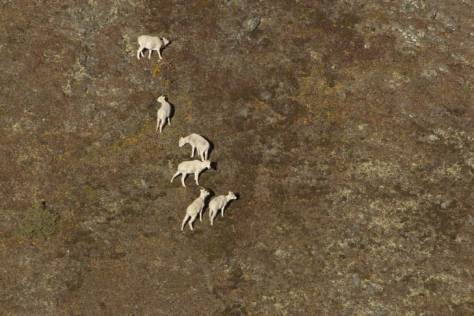Wild Sheep Summit Inspires In San Antonio
Free Fishing Day Set For June 4
June 1, 2022
Fin-Nor Launches New Sunglass Innovations
June 7, 2022There wasn’t a dry eye in the room.
Well, if there was, much restraint went into keeping them that way.
As the wild and domestic sheep disease documentary Transmission wrapped up and director and producer Jesse Bone approached the podium for questions, there was a palpable sense of urgency.
It was like the previous day’s viewing of Team Bighorn, which showed the Herculean efforts to capture, collar and test wild sheep for pathogen/disease in Idaho.
There’s much work to do but there’s a powerful group of allies to make it happen.
Chester Moore
![]()
Watch Team Bighorn below.
Team Bighorn Film from Silverline Films on Vimeo. https://player.vimeo.com/video/688497898?h=00f1ee145a&dnt=1&app_id=122963According to movifree.org, Mycoplasma ovipneumoniae (M. ovi) is a bacterial species commonly found in the nasal cavity and sinuses of apparently healthy domestic sheep and goats.
It is transmitted to wild sheep and goats (bighorn sheep, thinhorn sheep, and mountain goats) via nose-to-nose contact and, less commonly, aerosol/droplet transmission. In bighorn sheep and very likely thinhorn sheep, M. ovi has been associated with large all-aged die-offs due to pneumonia, which is often followed by years of lower lamb birth and survival rates that can have devastating population impacts.
The two films were rallying cries at a two-day summit of the Wild Sheep Foundation (WSF) and its Chapters and Affiliates in San Antonio, TX.
Hosted by WSF Affiliate, the Texas Bighorn Society (TBS), the goal was to galvanize, organize and strategize wild sheep conservation.
“Leaders and delegates of our chapter and affiliate network convene every year in a one-tent, one-campfire gathering to address challenges and opportunities for wild sheep conservation across North America and internationally,” said Gray N. Thornton, President, and CEO of WSF.

Froylan Hernandez addresses the attendees on the status of bighorns in Texas. (Photo by Chester Moore)
From capture and removal plans to testing and treatment of domestic sheep herds in bighorn country, speaker after speaker tackled this topic.
Froylan Hernandez, Desert Bighorn Sheep Program Leader with the Texas Parks & Wildlife Department (TPWD), shared the latest on sheep in the Trans-Pecos.
That included drought-related issues and research showing non-indigenous aoudad carry M. ovi and are a growing threat to bighorns and other wildlife through food and habitat competition.
Taking a practical approach that considers the needs of private landowners as well as bighorns, TPWD is engaging the issue directly.
Other issues are impacting sheep as well. Thinhorns are feeling the impacts of climate change in Alaska and Canada. Migration corridors are being looked at and predation always looms as a growing threat.

Dall sheep have experienced die-offs in several ranges in Alaska due to climate change-related issues. WSF recently concluded a thinhorn summit in the Yukon to address these and other issues facing Dall and Stone Sheep. (USFWS Photo)
Despite recent die-offs, Texas is still just below historic (1800s) level desert bighorn populations thanks to the efforts of TPWD, TBS, WSF, and others.
New Mexico has seen a big shift in numbers to the positive over the last few decades and Mexico is experiencing a renaissance of sorts in desert bighorn sheep conservation and hunting.
Upgrade is the goal, but challenges continue to rise.
“We’re going to face those challenges and dare to do epic stuff,” Thornton said.
“We’re going to continue the legacy of putting and keeping wild sheep on the mountain and collaboratively we can make it happen in a big way.”
That was exemplified at the wrap-up dinner and auction that saw thousands of dollars raised for TBS water projects in West Texas.
A particular herd of desert bighorns has taken residence in a remote area near the Mexico border. And with current and historic drought an issue there, these projects could be lifesaving.
But that wasn’t all.
Just before the night was over, Thornton announced The Iowa Chapter of WSF sought to fund a special project in Nebraska.

Rocky Mountain bighorns in Nebraska were the recipients of funding generated from a call to action issued the last night of the summit. (Photo by Chester Moore)
With disease already an issue there, the hope is to spread healthy animals into other areas and expand the population.
More than $100,000 was raised with a $50,000 donation from WSF and the rest pledged from numerous chapters and affiliates.
It was an inspiring way to end an event that saw selfless dedication to a wildlife resource highlighted from the Yukon to Colorado and from Arizona to Wyoming.
From Stone sheep to California bighorns, no species or subspecies was left unmentioned, and each chapter and affiliate seemed focused on not only maintaining but growing sheep populations in their state.
This event was a major victory for hunter-conservationists.
It was evident without the interests of hunters and the funding that comes through WSF, its chapters, affiliates, and state/provincial/tribal sheep tags, these animals could easily slip into obscurity.
And that is inspiring because the commitment from everyone in the room was real and passionate.
And that’s a major victory for wild sheep.
For animals facing so many threats, it will take zeal and commitment to see them through.
And those two forces were alive and well at the summit.
Conservationists from the United States, Canada, and Mexico left inspired for the cause of wild sheep.
There’s much work to do but there’s a powerful group of allies to make it happen.
Chester Moore
![]()






